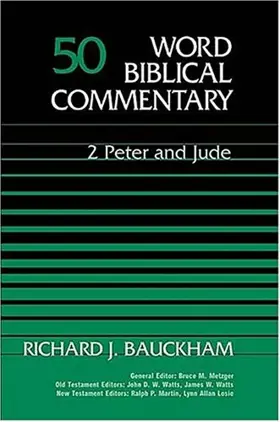

2 Peter and Jude
Pages
388
Publisher
Thomas Nelson
Published
1/1/1983
ISBN-13
9780849902499
Collections
This book appears in the following featured collections.
- John Piper's NT Commentary Recommendations by John Piper (Desiring God)
- Favorite Advanced NT Commentaries by Jeremy Pierce (parableman)
- Recommended NT Commentaries by Denver Seminary Journal
- D. A. Carson's Commentary "Best Buys" by D. A. Carson
- Ultimate Commentary Collection: NT Technical by John Glynn
- Essential NT Commentaries for a Preacher's Library by Derek W. H. Thomas
- New Testament Advanced Commentaries by Moore Theological College Journal: Societas
- Basic Library Booklist by Detroit Baptist Theological Seminary
- Building an NT Commentary Library by Invitation to Biblical Interpretation (Kostenberger & Patterson)
- The Pastor’s Bookshelf by Scot McKnight
- New Testament Commentaries & Monographs by Princeton Theological Seminary
- Nijay Gupta's Top NT Commentaries by Nijay K. Gupta
- Recommended New Testament Commentaries for Evangelical Pastors by Thomas R. Schreiner
- TGC: Scholarly Commentaries by The Gospel Coalition
Reviews
Bauckham’s classic work pays careful attention to both the Greek text and the larger Greco-Roman and Jewish worlds in which the letters were written. He considers relevant literature exhaustively and is especially strong on parallels in Second Temple Judaism’s texts. Though Bauckham asserts that 2 Peter depends on Jude and is pseudonymous, academic readers shouldn’t miss Bauckham’s balanced commentary.
[Full Review]
The best option on a pair of texts which get less attention. Bauckham's expertise in Jewish and Christian apocalyptic and eschatalogical texts makes him the best person I can think of to write this commentary. Even after 35 years, it's still the best.
One of the most often-cited commentaries on the epistles, and justly so; worthy of being on this list although it is now somewhat dated.
[Full Review]
While Bauckham’s commentary is not quite the consensus favorite, it is unanimously held up as a brilliant and helpful treatment. Yet every commentator on the commentaries critiques it for one small but important eccentricity: Bauckham does not believe that Peter wrote 2 Peter! That detail aside, the experts all agree this commentary is a must-read for the pastor and scholar. D.A. Carson says, “[T]his point should not put anyone off using what has been and will be the standard in the field for decades to come.”
[Full Review]
This commentary is the most important contribution on these two letters in modern times. All commentaries after Bauckham will need to deal with his understanding of the letters. The introductions to the letters are perhaps more important that the commentary sections. Bauckham treats Jude first because he dates the book very early, no later that A.D. 50. He does not see any evidence of “Paulinism” nor the “early catholicism” found in later letters. Jude is the brother of Jesus and the letter reflects an apocalyptic Palestinian Judaism. Whether this is really Jesus’ brother or someone writing in his name is an open question for Bauckham, but he thinks that all the evidence is “consistent with authorship by Jude the brother of Jesus” (16). Second Peter, on the other hand, Bauckham thinks is a pseudonymous example of the literary genre testament. Like the Testament of the Twelve Patriarchs, 2 Peter was written using the character Peter in order to give a moral exhortation to a new generation of believers. He argues that the original audience would have understood this as a common literary convention. The readers (living at the end of the first century) would have expected the writer to do an accurate job of reporting “the essence of Peter’s teaching” but they would not have expected that Peter wrote the letter himself (134). Bauckham is an expert in the literature of the Second Temple Period and he uses this literature to interpret these two letters as apocalyptic literature consistent with the literature being produced by Jews in the middle of the first century. His section on 2 Peter’s literary influences is excellent. The commentary proceeds phrase by phrase through the Greek text without transliteration. As expected, the commentary interested in the various allusions to the Hebrew Bible or other literature. This makes for a challenging read, but ultimately rewarding to the diligent student.
[Full Review]
R Bauckham's commentary on 2 Peter and Jude was ground-breaking in completeness and sensitivity to the Jewish context, drawing these two letters out of worn down theological diatribes and back into original contexts
[Full Review]
Bauckham's commentary is undoubtedly the best commentary for academic work on Jude. In particular, his excursus on Jude's usage of the Testament of Moses was a masterpiece of scholarship, and I found his reconstruction of the general contents of the lost ending of the Testament of Moses to be very convincing. His notes on textual variants were also very helpful (there are a couple of very difficult readings in Jude). The whole commentary was a model of detail and thoroughness. My only complaint is that I wish he had written a little more for the 'Explanation' section of the commentary. 5 stars out of 5.
[Full Review]
Many rank Bauckham's work as the best commentary on these two biblical books. Unfortunately (and without sufficient reason) Bauckham concludes that Peter was not the author of 2 Peter. Although most critical scholars would agree with Bauckham on this point, it is a significant mistake that mars a work containing some very helpful insights. For helpful responses to the arguments Bauckham presents, see the commentaries by Green and Davids.
[Full Review]
Does not believe Peter wrote it!















